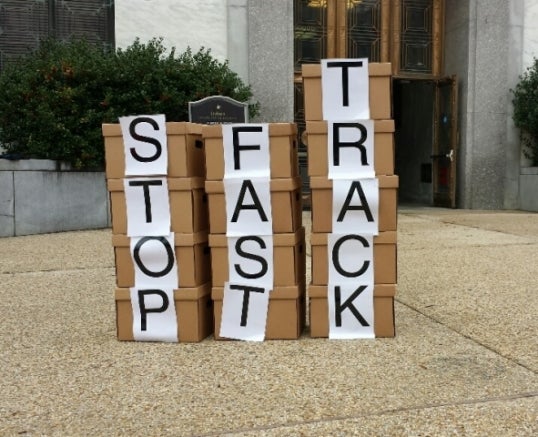Headline News
Hoffa: Fast Track Means Fewer Michigan Jobs

By Teamsters General President James P. Hoffa
Published in the Detroit News, November 12, 2014
Election season is now behind us. But that doesn’t mean the policy battles for 2014 are finished. A lame-duck session of Congress convenes today, and Capitol Hill lawmakers could consider fast-track trade promotion authority in the coming weeks that would jeopardize thousands of jobs in Michigan and nationwide.
The Great Lakes State lost nearly 255,000 manufacturing jobs during the past 20 years due to rotten trade deals like the North American Free Trade Agreement, according to numbers released by the Bureau of Labor Statistics earlier this year. That would just be the start of job losses, however, if elected officials agree to waive their constitutional obligation to review trade deals by approving fast track.
Fast track doesn’t allow Congress to make changes to trade agreements and limits debate. Instead, lawmakers can only take an up-or-down vote on such pacts. And that’s a problem when these proposals are being secretly negotiated. The public doesn’t know what’s going on, and even those on Capitol Hill don’t have full access.
One such deal, the Trans-Pacific Partnership (TPP), is currently being discussed at the Asia-Pacific Economic Cooperation summit. Negotiators from the U.S. and 11 other Pacific Rim countries are trying to bring talks to a conclusion. Big business supporters of TPP would like nothing more than to have a vehicle in place that eases its path to approval in the U.S.
But the Teamsters and our fair-trade allies are demanding that Congress hit the brakes on fast track. Last week, we submitted 664,000 signatures to Capitol Hill leaders urging them not to approve a trade vehicle that will result in jobs being shipped overseas and unsafe food and manufactured goods coming to our shores. It’s part of an ongoing campaign against fast track highlighting its impact on working families.
Some are suggesting that fast track will stand a better chance come next year due to the Republican takeover of the Senate. But there are historical reasons to believe that the real fight for the trade vehicle will be in the already GOP-controlled House, just like it was when then-President Bill Clinton sought to have fast track renewed in 1998.
The good news is there is a strong bipartisan opposition to moving forward with the current version of fast track in the House led by lawmakers like Reps. Rosa DeLauro (D-Conn.) and Walter Jones (R-N.C.). And there is no reason to think that will change despite last week’s elections results.
That said, workers must remain on guard due to the significant consequences that would result from passage of fast track and the rubber stamping of trade deals like the TPP. Opponents have made clear that the Pacific Rim trade deal, for instance, doesn’t address currency manipulation, which would have a devastating effect on Michigan’s auto industry as well as other American sectors. How can TPP be considered good for this country when U.S. producers won’t be able to compete with cheap goods made abroad by a poorly-paid workforce?
There is no good reason for lawmakers to support fast track. If a trade deal is so good, it should be able to stand on its own. But there is simply too much that is unknown about trade pacts like the TPP to allow Congress to drop its oversight of the process. The signatures we submitted prove the American public understands the issue. Now elected officials need to do the same.